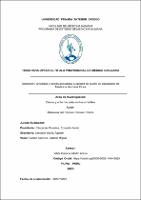Depresión, ansiedad y estrés asociados a calidad de sueño en estudiante de Medicina Humana Piura
Abstract
OBJETIVO: Estimar la asociación entre depresión, ansiedad y estrés, con la calidad de sueño en estudiantes de medicina humana en Piura.
MATERIAL Y MÉTODO: Estudio de tipo observacional, analítico - transversal, prospectivo y con recolección de datos primarios mediante recolección por encuesta presencial, y cálculo de muestra directa. Se utilizó una ficha de recolección de datos para la edad, sexo, año d estudios y el test DASS-21 para evaluar sintomatología de depresión, ansiedad y estrés; así mismo se usó el Test de Pittsburgh para evaluar la calidad de sueño.
RESULTADOS: Se incluyeron 358 estudiantes, en los cuales se encontró que aquellos que presentaron sintomatología depresiva dicotómica tuvieron 35% más riesgo de presentar mala calidad de sueño (RPc=1.35, IC 95%= 1.03 - 1.77, p= 0.028), aquellos que presentaron sintomatología ansiosa dicotómica tuvieron 66% más riesgo de presentar mala calidad de sueño (RPc=1.66, IC 95%= 1.24 - 2.21, p= 0.001), y aquellos que presentaron sintomatología de estrés dicotómica tuvieron 2 veces el riesgo presentar mala calidad de sueño (RPc=2.09, IC 95%= 1.36 - 3.20, p= 0.001).
CONCLUSIONES: En este grupo de estudiantes de medicina, se encontró que los factores asociados a mala calidad de sueño fueron principalmente la sintomatología depresiva, ansiosa y estrés. Además, se evidenció que aquellos estudiantes que presentaron mayores grados de síntomas de depresión, ansiedad y estrés, presentaron mayor riesgo de tener mala calidad de sueño. OBJECTIVE: To estimate the association between depression, anxiety and stress, with the quality of sleep in human medicine students in the city of Piura.
MATERIAL AND METHOD: Observational, analytical-cross-sectional, prospective study with primary data collection by means of a face-to-face survey and direct sample calculation. A data collection form was used for age, sex, year of study and the DASS-21 test to evaluate symptoms of depression, anxiety and stress; the Pittsburgh Test was also used to evaluate sleep quality.
RESULTS: 358 students were included, in which it was found that those who presented dichotomous depressive symptomatology had 35% higher risk of presenting poor sleep quality (RPc=1.35, 95% CI= 1.03 - 1.77, p= 0. 028), those who presented dichotomous anxious symptomatology had 66% higher risk of presenting poor sleep quality (RPc=1.66, 95% CI= 1.24 - 2.21, p= 0.001), and those who presented dichotomous stress symptomatology had 2 times the risk of presenting poor sleep quality (RPc=2.09, 95% CI= 1.36 - 3.20, p= 0.001).
CONCLUSIONS: In this group of medical students, it was found that the factors associated with poor sleep quality were mainly depressive symptomatology, anxiety and stress. In addition, it was found that those students who presented a higher degree of symptoms of depression, anxiety and stress, presented a higher risk of having poor sleep quality.
Collections
- Medicina Humana [2969]


